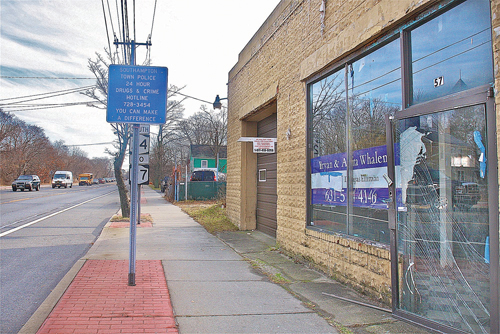Southampton Town inks deal with master developer for Riverside

Southampton Town has signed a contract with a “master developer” as part of a multi-pronged approach of revitalizing the long-beleaguered Riverside area that’s just a short walk away from downtown Riverhead, which has made its own strides as of late.
The development firm, Renaissance Downtowns of Plainview, has also leased office space on Peconic Avenue and is advertising for local employees to man the office.
“It’s pretty exciting,” said Southampton Councilman Brad Bender, who was president of the Flanders, Riverside and Northampton Community Association before being elected to the Town Board last fall.
The Riverside area has been known for high vacancy, crime and poverty rates and limited commercial development due to environmental issues that limit development there. In addition, a large amount of land in the area is publicly owned and off the tax rolls.
The town has undertaken many studies of Riverside over the years, but has yet to implement the recommendations that emerged from most of them.
“This isn’t just another study,” Mr. Bender said, indicating that the plan here incorporates development the area, as opposed to past studies that simply made recommendations. Mr. Bender said he’s been working on revitalizing Riverside for the past three years as a FRNCA member along with Supervisor Anna Throne-Holst and Councilwoman Christine Scalera, who are part of an economic redevelopment committee for the area.
The master developer contract signed Wednesday with Renaissance Downtowns requires Renaissance to develop an “action plan” that must be approved by the Town Board. But the town isn’t paying Renaissance anything for that work. Any money the firm makes off the arrangement will come from its own development efforts. The town selected Renaissance — which has led similar projects in Hempstead, Glen Cove and Huntington Station — in December and spent four months negotiating a contract with the firm before finally signing this week.
“It’s a public-private partnership,” said Sean McLean, a Flanders resident who is also vice president of planning development for Renaissance. “We are in partnership with the municipality. They didn’t hire us, they don’t pay us. We are a for-profit real estate redevelopment company.”
Renaissance will spend its own money and assume its own risk in trying to redevelop the business area of Riverside, he said.
The firm can either try to buy private property on its own or can work with individual property owners to develop their land, explained Mr. McLean. Renaissance also will try to attract state or federal grant money to the area.
The contract prevents the town from selling or leasing town-owned land in Riverside that was purchased for economic development until the study is completed, which must be done within 12 months, according to Renaissance attorney Wayne Bruyn, who spoke at the Town Board work session last Thursday. At that point, according to the contract, Renaissance will have the opportunity to purchase that acreage.
Renaissance has leased office space at 110 Peconic Ave. in Riverside, across from Peconic Paddler, and has been advertising for employees with expertise in social media and community organizing. Whether the firm will hires one full-time employee or several part-timers has yet to be decided, Mr. McLean said. He’s hoping the office will be open by May 1 and will be a place where people can stop in to share ideas or get information about ongoing redevelopment plans for Riverside.
“The community is very important to us in this engagement,” Mr. McLean said at Monday’s FRNCA meeting. “If the community doesn’t want it, then we don’t want it. If the community does want something, and we can understand what that is, we can vet out the economics and determine if what the community wants is economically feasible.
“If we can’t make money on it, then you don’t want us to build it either. If we decide we should have a 20-story hotel and you guys want that, but then it’s not going to make any money and can’t support itself, nobody wants that empty 20-story building sitting there.”
In an interview Monday, FRNCA president Vince Taldone said that, with the contract signed, revitalization efforts will really start picking up speed.
“These people don’t make any money unless they perform,” Mr. Taldone said. “There’s really no incentive whatsoever for them to delay. I’m really so excited. The moment the contract is signed, I think this is going to take off with lightning speed.”







